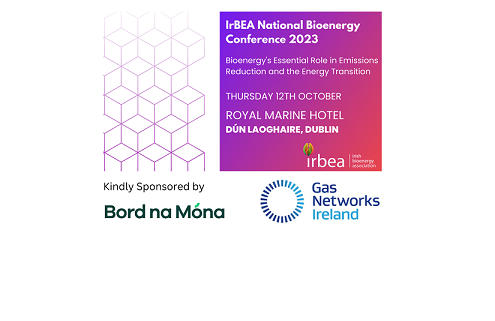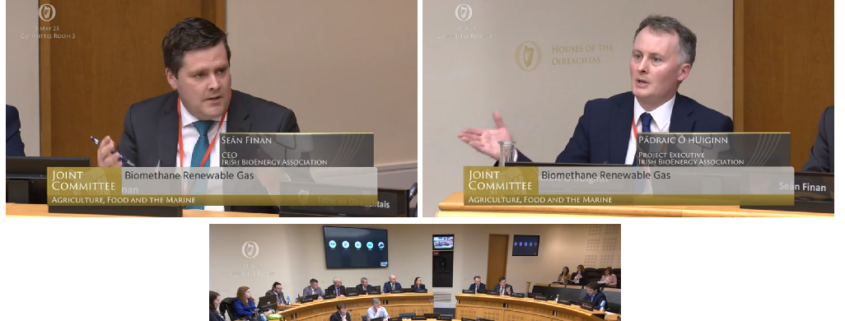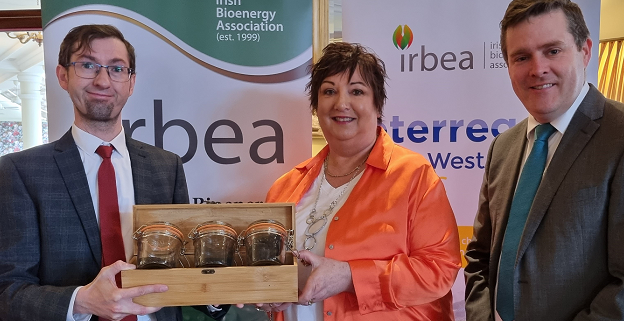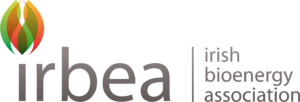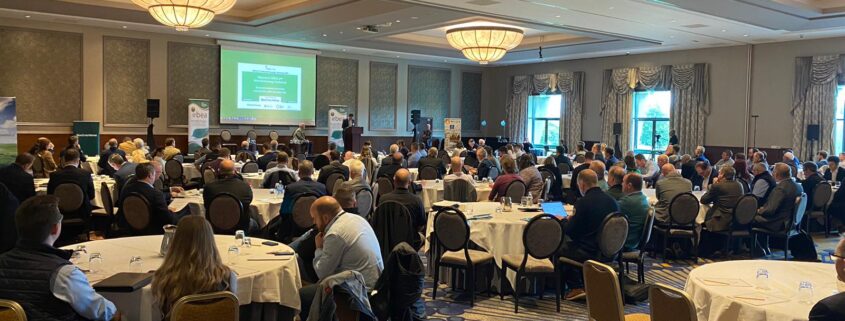Press Release: Ireland must immediately activate Bioenergy’s essential role in emissions reduction and achieving renewable energy targets

Pictured here: L to R Padraig Fleming, Biomethane Programme Manager at Gas Networks Ireland (GNI), Shannon Oldfield, Events Manager, Gas Network Ireland, Seán Finan, IrBEA CEO, Minister Eamon Ryan T.D., Leader of the Green Party and Minister for Environment, Climate, Communications and Transport, Paddy Phelan, IrBEA President & CEO Southeast Energy Agency, Brendan Kelly, Head of Commercial at Bord na Móna Renewable Energy.
IrBEA’s 22nd National Bioenergy Conference took place last week (Thursday 12th of October) at the Royal Marine Hotel, Dún Laoghaire, County Dublin.
Bioenergy is the largest source of renewable energy globally. Today’s national bioenergy conference is focusing on the need to accelerate the uptake of bioenergy’s recognition in both policy and technology deployment in Ireland. Solid biomass, biogas/biomethane, liquid biofuels and biochar all have a significant role to play in a broader mix of technology and fuelling options to reduce emissions and promote a transition to renewable energy.
Paddy Phelan, Irish Bioenergy Association (IrBEA) President and CEO of the Southeast Energy Agency said: “We need all renewable technologies and renewable fuels to be deployed as part of a broad renewable energy policy in Ireland. The conference title ‘Bioenergy’s essential role in emissions reduction and the energy transition’ is very appropriate in the current environment of a climate crisis and worries about energy security. IrBEA members have the technologies and fuelling solutions which will address all those concerns.”
Phelan continued “Our pursuit of renewable energy, specifically bioenergy, stands at a crossroads in Ireland. We must address policy gaps and foster wider adoption to ensure that all sectors can participate in carbon neutrality, Environmental, Sustainability and Governance (ESG) excellence, and insulation from energy price volatility. Together, we can overcome challenges and seize the opportunities presented by bioenergy to create a greener, more sustainable, and resilient Ireland for future generations.”
Bord na Móna and Gas Networks Ireland (GNI) are the co- sponsors of the 22nd national bioenergy conference. Bord na Móna has plans to deploy a wide range of renewable energy generation. Specifically in bioenergy this includes 100% biomass use at Edenderry Power limited and the development of biomethane production capacity. Gas Networks Ireland is actively engaged in encouraging the development of an indigenous biomethane industry here.
From 2024 onwards, Bord na Móna’s Edenderry Power Plant will operate off 100% biomass. This shows the potential of bioenergy and how it can help Ireland transition from fossil fuels to low carbon, renewable energy generation. By 2024, Bord na Móna’s Edenderry Power Plant will be supplying 100% renewable electricity to the national grid. As a dispatchable plant, this will help support the national grid when the wind doesn’t blow or the sun doesn’t shine. It will also stabilise the national grid and enable more MW of intermittent renewable energy (such as wind and solar) to be brought onto the system to help Ireland achieve its Climate goals. Upwards of 80% of the Biomass material used at Bord na Móna’s Edenderry Power Plant is supplied by Irish suppliers. The company’s focus is on maximizing indigenous biomass supplies in the coming years. Bord na Móna only sources sustainable biomass meeting the strict criteria outlined in the EU’s Renewable Energy Directive. Bord na Móna’s biomass requirement provides a significant socio-economic benefit to rural Irish communities.
Brendan Kelly, Commercial Manager, Bord na Móna Renewable Energy said: “Bord na Móna is delighted to co-sponsor the 2023 IrBEA National Bioenergy Conference which highlights the critical role Bioenergy is playing and will continue to play in Ireland’s drive towards Net Zero. Leveraging biomass as a carbon-neutral energy source through its Edenderry Power Plant forms an important part of Bord na Móna’s climate solutions offering. Edenderry Power Plant will operate off 100% biomass from January 2024, assisting Ireland meet its vital climate action targets. We welcome the ambition of IrBEA and the wider industry in looking to play an even bigger role in helping Ireland reach its Climate Action Plan targets.”
A Biomethane Energy Report has been compiled and published by Gas Networks Ireland based upon Request for Information (RFI) responses and outlines the development of the gas network to prepare for increased biomethane connections and injection.
Key facts and figures from the Gas Networks Ireland Biomethane Energy Report:
- 176 prospective producer responses received
- in volume terms, responses total to 14.8 TWh annual production
- Median plant production capacity is 40 GWh per annum
- Median distance from producers to the gas network is 5km
- Emissions reductions from 14.8 TWh of biomethane of 3.94 Mt CO2 eq per annum by 2030
Padraig Fleming, Biomethane Programme Manager at Gas Networks Ireland said “Gas Networks Ireland is delighted to co-sponsor the 2023 IrBEA National Bioenergy Conference. The RFI response in terms of production volumes is more than two and a half times that of Ireland’s stated ambition of 5.7 TWh of biomethane production by 2030. Responses, both in number and volume terms, serve to underline the robustness of the Government’s 2030 biomethane ambition. Furthermore, analysis of current domestic consumption of natural gas relative to the estimates for the national biomethane production potential in 2030 from the RFI indicates that 26% of total gas demand could be met by biomethane.”
Fleming continued “Biomethane is one of the renewable gases of the future and is available today to decarbonise the energy system. Ireland has a real opportunity to develop a biomethane industry at scale, which will offer numerous benefits for our agricultural industry, the decarbonisation of our economy and the development of a key indigenous energy resource in the coming years.”
Seán Finan, Irish Bioenergy Association (IrBEA) CEO concluded: “IrBEA is active in the promotion and deployment of solid, liquid or gaseous bioenergy. Today, we explore the many aspects associated with our industry including its potential and opportunity as well as hearing from experts in the emerging carbon removals sector. IrBEA members are keenly focused on developing and delivering clean, renewable enRergy, along with carbon storage and resource recovery solutions.”
Picture Caption: L to R Padraig Fleming, Biomethane Programme Manager at Gas Networks Ireland (GNI), Shannon Oldfield, Events Manager, Gas Network Ireland, Seán Finan, IrBEA CEO, Minister Eamon Ryan T.D., Leader of the Green Party and Minister for Environment, Climate, Communications and Transport, Paddy Phelan, IrBEA President & CEO Southeast Energy Agency, Brendan Kelly, Head of Commercial at Bord na Móna Renewable Energy.


